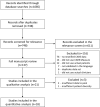Socioeconomic, racial and ethnic differences in patient experience of clinician empathy: Results of a systematic review and meta-analysis
- PMID: 33657153
- PMCID: PMC7928470
- DOI: 10.1371/journal.pone.0247259
Socioeconomic, racial and ethnic differences in patient experience of clinician empathy: Results of a systematic review and meta-analysis
Abstract
Introduction: Empathy is essential for high quality health care. Health care disparities may reflect a systemic lack of empathy for disadvantaged people; however, few data exist on disparities in patient experience of empathy during face-to-face health care encounters with individual clinicians. We systematically analyzed the literature to test if socioeconomic status (SES) and race/ethnicity disparities exist in patient-reported experience of clinician empathy.
Methods: Using a published protocol, we searched Ovid MEDLINE, PubMed, CINAHL, EMBASE, CENTRAL and PsychINFO for studies using the Consultation and Relational Empathy (CARE) Measure, which to date is the most commonly used and well-validated methodology for measuring clinician empathy from the patient perspective. We included studies containing CARE Measure data stratified by SES and/or race/ethnicity. We contacted authors to request stratified data, when necessary. We performed quantitative meta-analyses using random effects models to test for empathy differences by SES and race/ethnicity.
Results: Eighteen studies (n = 9,708 patients) were included. We found that, compared to patients whose SES was not low, low SES patients experienced lower empathy from clinicians (mean difference = -0.87 [95% confidence interval -1.72 to -0.02]). Compared to white patients, empathy scores were numerically lower for patients of multiple race/ethnicity groups (Black/African American, Asian, Native American, and all non-whites combined) but none of these differences reached statistical significance.
Conclusion: These data suggest an empathy gap may exist for patients with low SES. More research is needed to further test for SES and race/ethnicity disparities in clinician empathy and help promote health care equity.
Trial registration: Registration (PROSPERO): CRD42019142809.
Conflict of interest statement
Authors Anthony Mazzarelli and Stephen Trzeciak are authors of a book on compassion science, entitled “Compassionomics”. This does not alter our adherence to PLOS ONE policies on sharing data and materials. None of the other authors have potential competing interests to disclose.
Figures



References
-
- Del Canale S, Louis DZ, Maio V, Wang X, Rossi G, Hojat M, et al.. The relationship between physician empathy and disease complications: an empirical study of primary care physicians and their diabetic patients in Parma, Italy. Academic Medicine. 2012;87(9):1243–9. 10.1097/ACM.0b013e3182628fbf - DOI - PubMed
-
- Flickinger TE, Saha S, Roter D, Korthuis PT, Sharp V, Cohn J, et al.. Clinician empathy is associated with differences in patient-clinician communication behaviors and higher medication self-efficacy in HIV care. Patient Education and Counseling. 2016;99(2):220–6. 10.1016/j.pec.2015.09.001 - DOI - PMC - PubMed
Publication types
MeSH terms
LinkOut - more resources
Full Text Sources
Other Literature Sources
Medical
Miscellaneous

